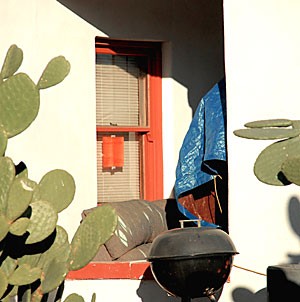One UA student has already been reported to the Dean of Students Office this semester for receiving a red tag under a new policy that took effect in January, which means students who party off-campus could face dual punishment.
Veda Kowalski, associate dean of students, said students who receive citations off-campus for red tag incidents will face consequences with the Tucson Police Department and from the UA, including taking part in an educational program.
Since the policy went into effect this year, nine red-tagging incidences have been reported to the Dean of Students Office, one of which involved a UA student, Kowalski said.
University and community relationships are not a new issue.
The Student Code of Conduct allows the university to look at student behavior in the community, said Kowalski. The goal is not to punish students or make them feel like the dean is out to get them, but to educate about being good community members and hold them accountable for their actions, Kowalski said.
The TPD will send a weekly report of all red tag recipients to the Dean of Students’ Office.
Using the Student Information System, the Dean of Students Office will determine which recipients are UA students.
Red tags can be given out to people who are hosting an “”unruly gathering,”” according to the City of Tucson’s Unruly Gathering Ordinance.
The ordinance describes an unruly gathering as a gathering of five or more people on private property, excessive noise, obstruction of public streets and serving alcohol to minors.
Carolyn Parston, an undeclared freshman, said the new policy is an invasion of privacy.
“”If you choose to live off-campus and host a rowdy party, why should it be reported to the university?”” she said.
But the new policy gives the school and the community the opportunity to see who is getting red-tagged and what percent of recipients are actually UA students, Kowalski said.
Time will reveal how students will respond to the pilot program, but Kowalski plans to review its progress later this semester.
Though unaware of the new policy, Jim Kluger, former president of the Jefferson Park neighborhood association, said he has had a lot of experience with red-tagged students and parties getting out of hand.
A party with 10 to 25 friends is one thing, but once the party begins, it grows, Kluger said.
Even after the police arrive, cars cruise the neighborhood and people unassociated with students show up and cause trouble. Students do not realize that they put themselves in jeopardy of violence, said Kluger.
Kowalski said the university is not looking to break up all parties, but to prevent potential risk and danger in the community.









